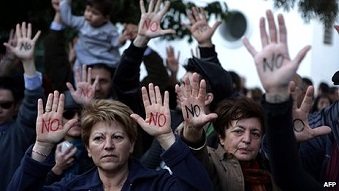Jordan Shilton
Evidence continues to mount of Breivik’s links with right-wing groups throughout Europe, contradicting the official presentation of him as a “lone wolf”.
On day two of his trial, Anders Breivik gave an hour-long defence of his slaughter of 77 people—mainly members of the Norwegian Labour Party youth section—in Oslo and the island of Utøya last July 22 and said that he would do it again.
Calling his massacre “the most sophisticated and spectacular political attack” in Europe since the Second World War, Breivik described himself as commander in an anti-communist, anti-Islamic “resistance” movement, at war against immigrants, Muslims and what he called a “Marxist dictatorship” in Norway.
Despite Breivik’s own insistence on the political nature of his crime, the preceding investigation and the trial itself are largely focused on the question of the killer’s sanity. Just days before the trial opened, a second report by court-appointed psychiatrists declared that Breivik should not be considered criminally insane, contradicting a previous assessment in November 2011.
The latest report was compiled over several months by two psychiatrists who conducted interviews with Breivik and observed his activity over long periods of time. But it by no means settles the question of Breivik’s sanity in the eyes of the court.
With two conflicting reports now having been presented, the court could yet conclude that the level of doubt about Breivik’s mental state is sufficient to declare him criminally insane. This would result in his serving his detention in a mental health institution rather than in prison.
The debate has served to obscure numerous questions over the role of the state and security forces in failing to prevent Breivik’s attacks. In January, it emerged that Breivik had warned Norwegian police in March 2011 that he was preparing a massacre of Labour Party youth members. This information was supposedly not communicated to the relevant authorities until after July 22.
This came on top of revelations about the failure of the intelligence services to detect Breivik’s purchase of large quantities of fertiliser from Poland, as well as their failure to investigate a farm which he rented on the outskirts of Oslo, where he prepared his attacks. The head of Norway’s intelligence service was compelled to resign as a result.






























